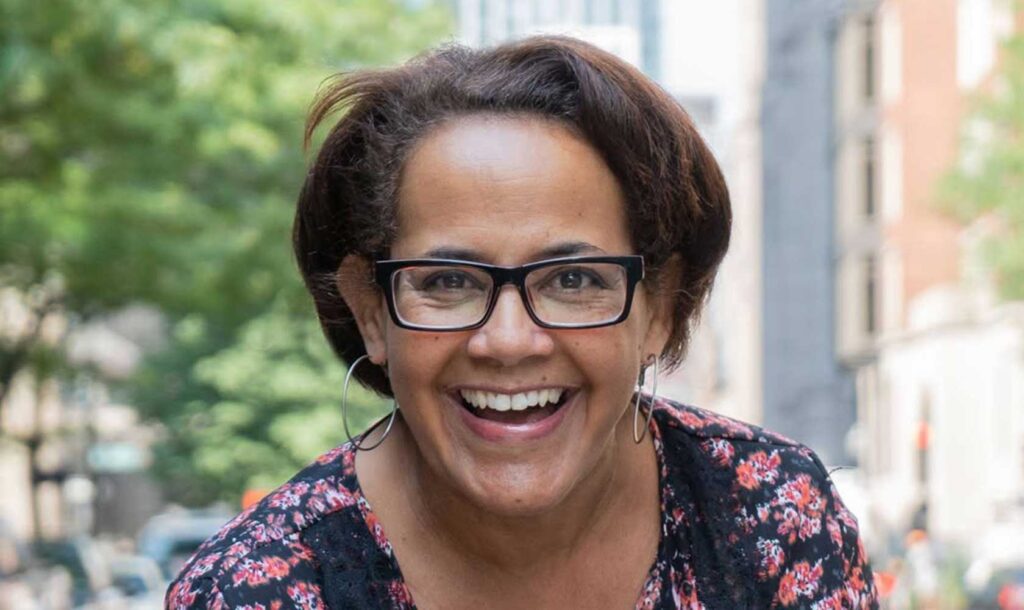
Banner Business Sponsored by The Boston Foundation
For 27 years, Lisa Simmons has been an integral part of the Roxbury International Film Festival (RoxFilm) as its executive and artistic producer. However, her roots in storytelling began when she was a theater actor, part of a greater legacy from a family deeply involved in cultural expression and the arts since the 1930s.
Now, she is behind the screens, curating films for RoxFilm, the annual festival that celebrates stories from, for and about people of color. This year’s festival runs from June 19 to June 27. Simmons works closely with her sister, Alison Simmons, who co-directs the festival.
At RoxFilm, it’s about using film as a catalyst for conversation. In an industry where people of color have historically been relegated to urban dramas, RoxFilm creates a space to expand what stories are told. “Black people and brown people are not a monolith,” said Simmons.
According to a 2021 McKinsey report, increasing the number of Black professionals in vital off-screen roles, including producers and directors, helps create a multiplier effect that increases representation across the industry. Simmons has been working toward that goal for decades.
Shaping the narrative has always been part of Simmons’ vision. RoxFilm, rooted in a rich legacy as a collaboration between The Color Film Collaborative and ACT Roxbury, launched with just $5,000 in funding.
Over the past decade, Simmons has shifted investments from attracting celebrities to supporting local and first-time filmmakers. “We’re a filmmakers’ festival,” she said.
Isara Krieger, the documentary filmmaker behind “The Highest Standard,” a film following three Boston Public School students navigating the transition to private high schools, was a first-time director. “It was a scary process to complete this film,” she said. Growing up in Jamaica Plain, Krieger wanted to address the educational gap she witnessed. Recognizing the power of this story, Simmons invited Krieger to screen the film at the festival, and it won “Audience Favorite.”
“Lisa [Simmons] felt like a strong advocate for me,” said Krieger.
Simmons empowers first-time filmmakers to take ownership of their art. She reaffirms their ability to create and often tells creators, “You’re a filmmaker, and you need to own that.” At RoxFilm, they value authenticity and believe these stories are crucial, especially when many are being erased.
The impact of films that prioritize representation is profound. According to the 2021 UCLA Hollywood Diversity Report, films with 21% to 30% minority representation had higher ratings across diverse demographics. Each year, the audience’s reactions to the screenings are priceless to Simmons. Audiences often leave screenings struck by stories they hadn’t encountered before. That kind of discovery is exactly what RoxFilm hopes to spark.
Simmons believes films can be both cathartic and connective, helping people feel less alone and empowering them to share experiences. In “The Highest Standard,” Krieger connected with students who had been a part of the film since middle school and are now about to graduate college. The relationships she built with them left a lasting impact.
Simmons urges emerging filmmakers to brand themselves as storytellers. “You don’t want to pigeonhole yourself,” she said. “You want to have the flexibility to tell different types of stories.”
Crafting these stories into films requires a strategic approach. “Any artistic endeavor has to be a business because you want to make sure it’s sustainable,” said Simmons. Still, even with funding, structure and exposure, she emphasizes that a strong story is key to creating a successful film.
That’s why “The Highest Standard” resonated deeply with audiences. Reflecting on her own experiences as a student in Boston, Krieger wanted to highlight the pressures of academic success and disparities in resources. “There is a danger in putting so much emphasis on high performance in education,” she said. “Students, when given the same access to resources for education, that’s the missing link for success.”
Developing a story into a film is a gradual process. It involves writing, revising, pitching, assembling a creative team, and working within a budget.
“George Lucas had to do ‘American Graffiti’ in order to do ‘Star Wars,’” Simmons said. She encourages emerging filmmakers to start with short films and smaller projects to gain exposure. The festival has previously provided grants and is developing a new screenwriting lab to support creators further.
During the festival, filmmakers can participate in daily virtual script readings.
Creators listen to their work aloud and receive feedback in collaboration with local actors. The network and connections extend beyond the festival. For example, Krieger connected with director Dawn Porter, another RoxFilm winner, and later worked on several of her films in San Francisco.
Alison Simmons, Lisa’s sister and the co-director/programmer, adds, “Supporting independent filmmakers of color during this time has been especially meaningful. We’re not only showcasing their work; we’re bringing them here for conversations, networking and real community building. This year, we’re proud to feature a strong lineup of local films and connect audiences with valuable resources.”
RoxFilm collaborates with organizations like the Museum of Fine Arts, Massachusetts College of Art and Design, Hibernian Hall and Haley House to support the filmmaking community. “I love that RoxFilm has this relationship with the MFA and other significant cultural hubs where the screenings are held,” Krieger said. “All the organizers cared about the work they were doing and really cared about the filmmakers.”
Over the years of building RoxFilm, Simmons’ intentionality still shows. “The curation of a festival isn’t just a bunch of movies you’re putting together. They’re people’s lives you’re putting together and allowing to be exhibited and seen by a wider audience,” she said.







